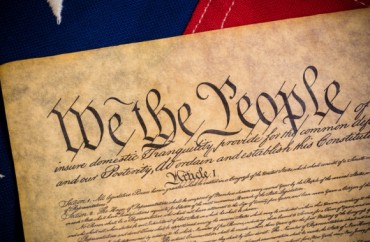
A professor at the University of Houston thinks that the United States Constitution was designed to maintain “white supremacy” for … all time.
In an Atlanta Black Star piece regarding the dismal state of Americans’ general historical knowledge, history and African-American Studies Professor Gerald Horne takes it further, arguing that if the United States ever “were to come to grips with the true nature of its history, it might curb the alienation and disillusionment that is now ricocheting through the Black community […]”
He contends the US started as a “slaveholder’s republic” — dedicated to the cause of white supremacy.
“But under unrelenting pressure from below by Africans,” he argues, “and from the international community, the United States had to retreat reluctantly and agonizingly from that national credo and its slaveholding status.”
Then, continues Horne, “it invented this national myth that the constitution, which was designed to entrench slavery and white supremacy forevermore, was somehow flexible enough to encompass the rest of us. This, apparently, is not the case as the exoneration of police officers who kill us on a regular basis tends to show,” as it produces a disconnect between the official stated policy of nondiscrimination and “what’s actually happening to Black people in the streets.”
However, suggests Horne, [the redemptive qualities of historical knowledge] is commonly undermined by the false historical narratives countries adopt to advance a profit-driven, nationalistic or patriotic agenda. Prior to the American Revolution, he explains, certain actions by the British crown served as a threat to colonial land speculators like George Washington making a killing both literally and financially by violently taking the land of Native Americans and profiting from the free labor of enslaved Africans. “In 1763, London issued a royal proclamation which sought to restrain the ability of settlers in North America to continue moving west, dispossessing Native Americans and taking their land so land speculators could profit,” Horne says. “Rather than accede to that decision— and also to the decision of 1772 where London had abolished slavery and there was a fear that decision would cross the Atlantic — you had the slaveholders rebel.”
“Instead,” Horne continues, “we are given this fairy tale about liberty and freedom,” tying it in to the continued mistreatment of black Americans, along with disproportionate racial incarceration and (school) discipline rates.
Horne had much the same message a year ago when he alleged Americans do not acknowledge the darker side of the country’s past because they still recite the Pledge of Allegiance and sing the National Anthem.
The question is: Is this really true?
It seems rather far-fetched.
As for the Constitution being “designed to entrench slavery and white supremacy forevermore,” is there not something called an amendment process? And what are the 13th, 14th, and 15th Amendments all about again?
Not to mention, perhaps Prof. Horne should heed the words of Abraham Lincoln:
[The Founders] found the institution existing among us, which they could not help; and they cast blame upon the British King for having permitted its introduction. BEFORE the constitution, they prohibited its introduction into the north-western Territory—the only country we owned, then free from it. AT the framing and adoption of the constitution, they forbore to so much as mention the word “slave” or “slavery” in the whole instrument. …
But this is not all. The earliest Congress, under the constitution, took the same view of slavery. They hedged and hemmed it in to the narrowest limits of necessity.
In 1794, they prohibited an out-going slave-trade—that is, the taking of slaves FROM the United States to sell.
In 1798, they prohibited the bringing of slaves from Africa, INTO the Mississippi Territory—this territory then comprising what are now the States of Mississippi and Alabama. This was TEN YEARS before they had the authority to do the same thing as to the States existing at the adoption of the constitution.
In 1800 they prohibited AMERICAN CITIZENS from trading in slaves between foreign countries—as, for instance, from Africa to Brazil.
In 1803 they passed a law in aid of one or two State laws, in restraint of the internal slave trade.
In 1807, in apparent hot haste, they passed the law, nearly a year in advance to take effect the first day of 1808—the very first day the constitution would permit—prohibiting the African slave trade by heavy pecuniary and corporal penalties.
In 1820, finding these provisions ineffectual, they declared the trade piracy, and annexed to it, the extreme penalty of death. While all this was passing in the general government, five or six of the original slave States had adopted systems of gradual emancipation; and by which the institution was rapidly becoming extinct within these limits.
Read the full Atlanta Black Star story.
MORE: U. Houston prof: Pledge of Allegiance, National Anthem ‘ignore’ America’s racist history
MORE: HS senior starts petition to eliminate ‘James Madison’ from school name
Like The College Fix on Facebook / Follow us on Twitter
IMAGE: Shutterstock





Please join the conversation about our stories on Facebook, Twitter, Instagram, Reddit, MeWe, Rumble, Gab, Minds and Gettr.